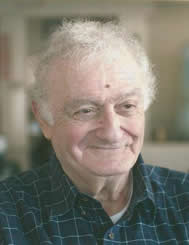

|

|
IN MEMORIAM
Gerard Ernest Caspary
Professor of History, Emeritus
UC Berkeley
1929 – 2008
Gerard Caspary, who died on April 6, 2008, was an extraordinary teacher who inspired generations of students of medieval and early church history and helped make the Department of History at the University of California, Berkeley, a magnet for graduate students in the field. His great learning, gentle wit, and intellectual precision were mainstays in the department and brought him the admiration of his colleagues and many friends.
Told of his passing, a former student (herself a renowned historian) responded with the quickness we reserve for the obvious. “He was the real thing.” And he was. For a long time, he was our medievalists' secret weapon in producing a stream of remarkable graduate students, including one who received a MacArthur Fellows award in 2007. People outside the university did not always know this. After all, he published only one book: Politics and Exegesis: Origen and the Two Swords (1979). It was the product of 20 years' reading, learning, thinking, ruminating. Even so, the book he published was less than half of what he had written, that half only a minuscule fraction of what he knew. His students had the benefit of being able to learn from the whole. A seminar with him was an experience of legend, for he could easily devote an entire semester to a single text, spinning complex histories out of every word and phrase. Once when he offered a celebrated course on Augustine, even his colleagues attended. He lived ideas. For him, thinking provided its own reward.
Born in Frankfurt on January 10, 1929, Gerry grew up in Paris, where his family had fled in 1933. In 1942, his parents were arrested and deported, dying in Auschwitz. With the assistance of the Westheimer family, neighbors of the Casparys, Gerry took refuge in southern France, where for the next three years a local family gave him shelter. After the war he emigrated to the United States to join his uncle, the renowned art historian Richard Krautheimer. He received his B.A. from Swarthmore College in 1950 and his M.A. and Ph.D. from Harvard University in 1952 and 1962. Upon receiving his doctorate he was awarded a Guggenheim Fellowship in 1962. He then taught at Smith College until 1970, when he came to Berkeley, where he had previously spent a year as a visitor. His research and teaching ranged broadly across medieval intellectual history but came to focus especially on patristics.
Gerry’s book on Origen highlighted the intersections and reciprocal influences of biblical exegesis, ecclesiology, and political ideology. As was typical of the consummate scholar, it was far more than a book about Origen. It was about the nature of Christian thought, as Caspary engaged in a conversation with 1,000 years of intellectual history. Thereafter, he worked to understand the development of what he called “the grammar of Christian thought,” the deep semantic, conceptual, and ideological structures that shaped Christian discourse in late Antiquity and the early Middle Ages. No one knew more about these subjects than he did. For that matter, few knew more about the Middle Ages generally. In his prime it was hard to find a book on any aspect of the field he had not read and mastered. Nor did his knowledge stop there, for his interests were capacious, and extended well beyond history into politics and world affairs, philosophy, biology and ethology.
He was also a Survivor, one of that fast-disappearing generation of intellectuals whose learning and experiences so deepened American education. His own experiences lay behind his passionate commitment to dispassionate scholarship and quickened his awareness of the power of ideas and the linkages between ideas and power. A few years before his retirement, he received a substantial collection of family correspondence, letters written between his grandmother in Sweden and his mother in France, during the depth of World War II. It set off a period of voracious reading and research about the Holocaust, the Second World War, Jewish history, and the history of modern Europe. He used the opportunity to teach an undergraduate seminar on the Holocaust, later recalling the class as the best teaching experience of his career. In 2005 he completed a translation and annotation of the most important letters in the collection, interspersing them with his personal memoir. He called the manuscript, “From the Edge of the Holocaust: Letters from my Mother and Grandmother, 1940-1943.” At once scholarly and deeply personal, it stands as a memorial of Gerry Caspary's skills as a historian and his constant awareness of the complexities of human memory, emotions, and thought.
Few historians have ranged so widely, with such depth of understanding, probably because so few are driven by such sheer love of ideas. That is why his student called him “the real thing.” He was the purest of scholars, the gentlest of teachers, of people the most humane.
Gerard Caspary was an only child, and while he came from a large extended family, he leaves no living near relatives. His friends and students, spread throughout the United States and beyond, have warmly embraced him as a deeply beloved friend and honored family member.
Paula S. Fass
Geoffrey Koziol
Irwin Scheiner